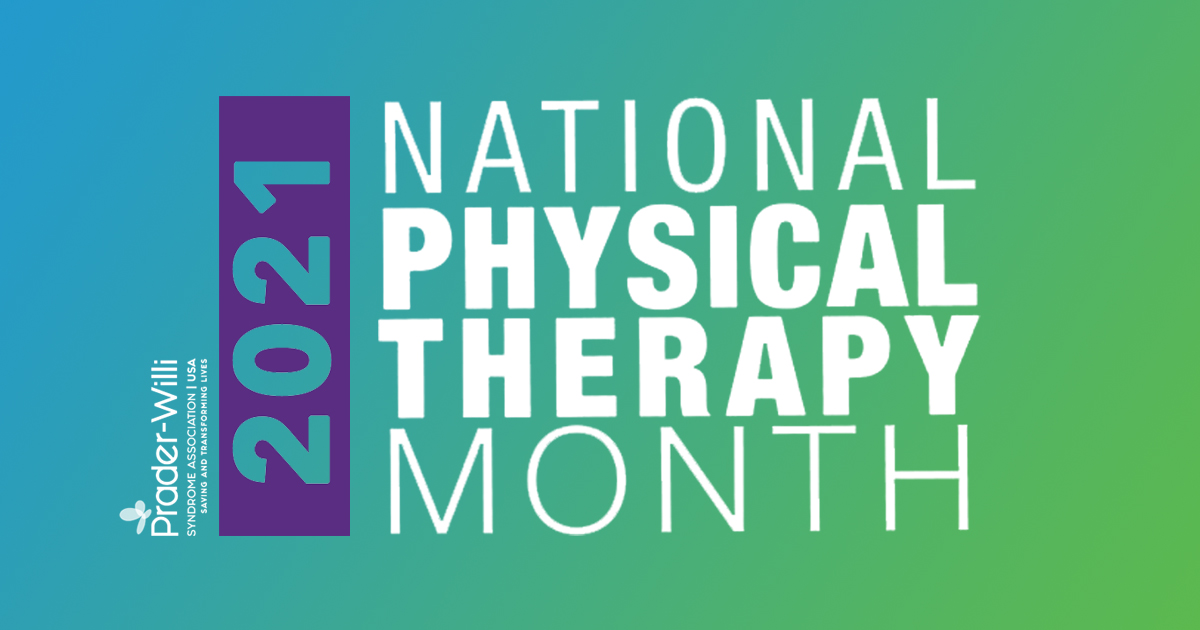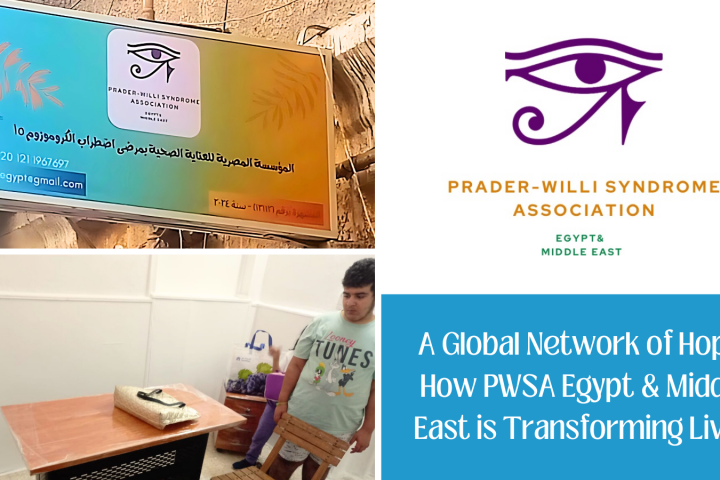October is nationally recognized as Physical Therapy Month. We want to thank the Physical Therapists who help our PWS community and provide care for our loved ones. PTs help address physical, mental, and behavioral challenges while working with those living with PWS. They help each PWS individual reach their greatest potential. Early on, physical therapists help children improve their balance, strength, and coordination skills.
While we recognize the amazing work PTs do for our community, we also want to take the opportunity to share helpful information when it comes to Physical Therapy and PWS.
PWSA | USA's publication Therapeutic Interventions for the Child with Prader-Willi Syndrome, written by Janice Agarwal, PT, CNDT, shares an in-depth look at PT and PWS, including physical therapy needs for individuals living with PWS from infancy through adulthood. Scroll below to find some of the information that can be found in Therapeutic Interventions for the Child with Prader-Willi Syndrome publication or click here to access the full booklet.
-------------------------------------------------------------------------------------------
What is a Pediatric Physical Therapist?
A pediatric physical therapist specializes in the examination, evaluation, treatment, and management of infants, children, and adolescents with developmental, neuromuscular, and skeletal disorders. Physical therapists collaborate with patients’ families and other medical, educational, developmental, and rehabilitation specialists to promote the participation of children in daily activities and routines in the home, school and community. Physical therapy treatments improve gross and fine motor skills, balance and coordination, and strength and endurance. In addition, physical therapy treatments enhance learning opportunities and sensory processing/integration.
What is Early Intervention?
Early Intervention (EI) is a systematic program of therapy, exercises, and activities designed to address developmental delays that may be experienced by children with Prader-Willi syndrome or other disabilities. These services are mandated by a federal law called the Individuals with Disabilities Education Act (IDEA). !e law requires that states provide EI services for all children who qualify, with the goal of enhancing the development of infants and toddlers and helping families understand and meet the needs of their children. !e most common EI services for infants with Prader-Willi syndrome are physical therapy, speech and language therapy, occupational therapy, and social services.
How to Start Pediatric Physical Therapy
The process begins with an interview to identify the child’s needs, usually while a newborn is still in the hospital, and continues with a physical and developmental evaluation of the child. !is evaluation may
include assessment of muscle and joint function, mobility, strength and endurance, cardiopulmonary status, posture and balance, and sensory motor and neuromotor development.
Share this!





 Jennifer Bolander has been serving as a Special Education Specialist for PWSA (USA) since October of 2015. She is a graduate of John Carroll University and lives in Ohio with her husband Brad and daughters Kate (17), and Sophia (13) who was born with PWS.
Jennifer Bolander has been serving as a Special Education Specialist for PWSA (USA) since October of 2015. She is a graduate of John Carroll University and lives in Ohio with her husband Brad and daughters Kate (17), and Sophia (13) who was born with PWS. Perry A. Zirkel has written more than 1,500 publications on various aspects of school law, with an emphasis on legal issues in special education. He writes a regular column for NAESP’s Principal magazine and NASP’s Communiqué newsletter, and he did so previously for Phi Delta Kappan and Teaching Exceptional Children.
Perry A. Zirkel has written more than 1,500 publications on various aspects of school law, with an emphasis on legal issues in special education. He writes a regular column for NAESP’s Principal magazine and NASP’s Communiqué newsletter, and he did so previously for Phi Delta Kappan and Teaching Exceptional Children. Evan has worked with the Prader-Willi Syndrome Association (USA) since 2007 primarily as a Crisis Intervention and Family Support Counselor. Evans works with parents and schools to foster strong collaborative relationships and appropriate educational environments for students with PWS.
Evan has worked with the Prader-Willi Syndrome Association (USA) since 2007 primarily as a Crisis Intervention and Family Support Counselor. Evans works with parents and schools to foster strong collaborative relationships and appropriate educational environments for students with PWS. Dr. Amy McTighe is the PWS Program Manager and Inpatient Teacher at the Center for Prader-Willi Syndrome at the Children’s Institute of Pittsburgh. She graduated from Duquesne University receiving her Bachelor’s and Master’s degree in Education with a focus on elementary education, special education, and language arts.
Dr. Amy McTighe is the PWS Program Manager and Inpatient Teacher at the Center for Prader-Willi Syndrome at the Children’s Institute of Pittsburgh. She graduated from Duquesne University receiving her Bachelor’s and Master’s degree in Education with a focus on elementary education, special education, and language arts. Staci Zimmerman works for Prader-Willi Syndrome Association of Colorado as an Individualized Education Program (IEP) consultant. Staci collaborates with the PWS multi-disciplinary clinic at the Children’s Hospital in Denver supporting families and school districts around the United States with their child’s Individual Educational Plan.
Staci Zimmerman works for Prader-Willi Syndrome Association of Colorado as an Individualized Education Program (IEP) consultant. Staci collaborates with the PWS multi-disciplinary clinic at the Children’s Hospital in Denver supporting families and school districts around the United States with their child’s Individual Educational Plan. Founded in 2001, SDLC is a non-profit legal services organization dedicated to protecting and advancing the legal rights of people with disabilities throughout the South. It partners with the Southern Poverty Law Center, Protection and Advocacy (P&A) programs, Legal Services Corporations (LSC) and disability organizations on major, systemic disability rights issues involving the Individuals with Disabilities Education Act (IDEA), Americans with Disabilities Act (ADA), and the federal Medicaid Act. Recently in November 2014, Jim retired.
Founded in 2001, SDLC is a non-profit legal services organization dedicated to protecting and advancing the legal rights of people with disabilities throughout the South. It partners with the Southern Poverty Law Center, Protection and Advocacy (P&A) programs, Legal Services Corporations (LSC) and disability organizations on major, systemic disability rights issues involving the Individuals with Disabilities Education Act (IDEA), Americans with Disabilities Act (ADA), and the federal Medicaid Act. Recently in November 2014, Jim retired.